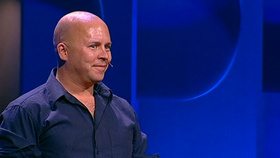Everyone, please think of your biggest personal goal.
请大家想想你们最大的人生目标。
For real -- you can take a second.
实际的人生目标。你得想一会儿。
You've got to feel this to learn it.
你有感觉知道你的目标。
Take a few seconds and think of your personal biggest goal, okay?
花几秒钟想想人生最大的目标,好么?
Imagine deciding right now that you're going to do it.
想象一下,立马做出决定你将要做的事情。
Imagine telling someone that you meet today what you're going to do.
想象一下,告诉你今天遇到的人你将要做什么。
Imagine their congratulations, and their high image of you.
想象他们的祝贺和你在他们眼中的英伟形象。
Doesn't it feel good to say it out loud?
大声说出来是不是十分爽?
Don't you feel one step closer already, like it's already becoming part of your identity?
你是不是觉得更进一步了,貌似这已经成为你自己的一部分?
Well, bad news: you should have kept your mouth shut, because that good feeling now will make you less likely to do it.
嗯,坏消息:你最好闭嘴,因为你的自我感觉良好,在现实中反而使你不太容易实现目标。

The repeated psychology tests have proven that telling someone your goal makes it less likely to happen.
许多心理测试已证明,告诉别人你的目标反而使目标不能实现。
Any time you have a goal, there are some steps that need to be done, some work that needs to be done in order to achieve it.
任何时候在你有个目标时,你得按计划做些工作来实现这个目标。
Ideally you would not be satisfied until you'd actually done the work.
理想状况下,除非你实际地做些工作,你才会满足。
But when you tell someone your goal and they acknowledge it, psychologists have found that it's called a "social reality."
但是当你告诉别人你的目标,大家也承认你的目标,心理学家发现,这被称为一种社会现实。
The mind is kind of tricked into feeling that it's already done.
思维定势让你有种感觉到你的目标已经达到。
And then because you've felt that satisfaction, you're less motivated to do the actual hard work necessary.
然后,因为你感到满足感,你不那么积极地做实际需要的艰苦工作。
So this goes against conventional wisdom that we should tell our friends our goals, right? So they hold us to it.
这观点和传统观点背道而驰,我们应该告诉我们朋友们关于我们的目标吗,对吗?他们鼓励我们实现目标。
So, let's look at the proof. 1926: Kurt Lewin, founder of social psychology, called this "substitution."
我们来看看这个证明。1926年,社会心理学的创始人库尔特·勒温称这个为“替代”。
1933: Wera Mahler found when it was acknowledged by others, it felt real in the mind.
1933年,伟拉·马勒发现当你的目标被别人承认,在你脑子里就好比这已经实现了。
1982, Peter Gollwitzer wrote a whole book about this, and in 2009, he did some new tests that were published.
1982年,皮特·哥尔维策尔关于此写了一本书,在2009年,他公布了一些新的实验证明。











